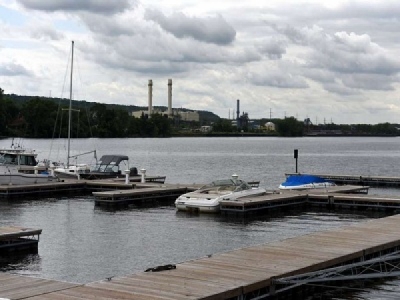
Posted on June 13, 2018
By Brian Nearing, TimesUnion.com
Efforts to dredge PCBs and other industrial chemicals from the Hudson River near a former Rensselaer dye factory under a $41 million cleanup project are expected to start this month.
Expected to take three years, work at the former BASF facility on Riverside Avenue calls for removal of about 38,700 cubic yards of river bottom — roughly equivalent to about 3,800 dump truck loads—that are tainted with PCBs and other chemicals, according to the state Department of Environmental Conservation.
Starting sometime this fall, there will be floating cranes digging sediment from the river and depositing it into barges, according to DEC spokeman Sean Mahar. The waste will then be shipped to a hazardous waste disposal site.
The project is being paid for by BASF Corp., which operated the factory before it was knocked down in 2010 after 117 years in business, according to DEC. The factory had discharge pipes that emptied into the river.
BASF will begin the project this month by installing more than 500 feet of new steel bulkhead to toughen a seawall along the river. Later this summer, dredging will begin and is expected to cover about five acres along the riverfront at the Port of Rensselaer.
Another seven acres of lesser-polluted river bottom will be monitored by BASF and DEC to see if chemicals are spreading.
PCBs found in that part of the river did not come from BASF, which did not use the chemical during its production, but other hazardous compounds now on the bottom did. PCB levels in that part of the river reached up to 270 parts per million. The safety standard is 1 ppm.
DEC wants dredging in the river to also remove volatile organics, and toxic heavy metals like lead, cadmium, copper, mercury, zinc and arsenic that got into the river from several production sewer and storm water discharge pipes.
BASF signed an agreement with DEC in 2010 to clean up the 75-acre plant and a 35-acre site to the south. BASF tests of the site found no evidence that pollution was migrating through soil or groundwater to surrounding properties.
Source: timesunion





